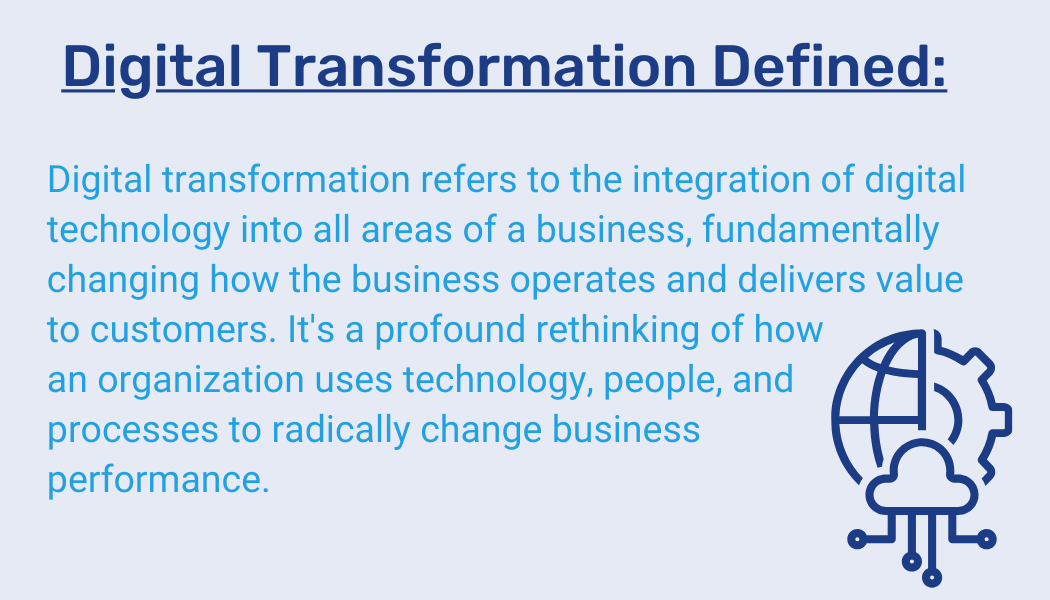
Author: Kysha Praciak
· 4 mins read · 551 views
What Exactly is Digital Transformation?

The Key Components and Implications of Digital Transformation:
- Integration of Digital Technology: This involves adopting advanced technologies such as AI, IoT, cloud computing, and big data analytics across the business. It’s not just about upgrading the IT infrastructure but embedding technology deeply into every part of the business.
- Cultural Change: Digital transformation requires a culture shift. Organizations need to embrace a culture of innovation, agility, and continuous learning. It’s about moving away from traditional hierarchies and silos and fostering an environment where experimentation and collaboration are encouraged.
- Customer-Centric Approach: Digital transformation puts the customer at the center of business decisions. It leverages data and technology to deliver personalized, engaging customer experiences. Businesses use insights from customer data to tailor their products, services, and interactions to individual customer needs and preferences.
- Operational Agility: Digital transformation enables businesses to become more agile. With the help of digital tools and processes, companies can adapt to market changes more quickly, innovate faster, and respond to customer needs in real time.
- Data-Driven Decision Making: One of the hallmarks of digital transformation is making decisions based on data analytics. Businesses leverage data to gain insights, predict trends, and make informed strategic decisions.
- Workforce Enablement: Technology is used to empower employees, improve efficiency, and foster collaboration. Digital tools and platforms enable employees to work from anywhere, streamline communication, and automate routine tasks.
- Digital Security and Compliance: As businesses become more digital, the importance of cybersecurity and data privacy grows. Digital transformation involves implementing robust security measures and ensuring compliance with data protection regulations.
What Does Digital Transformation Mean for Today’s Business Leaders?
For today’s business leaders, digital transformation represents both a monumental challenge and a tremendous opportunity. It demands a reimagining of business practices, models, and strategies to harness the power of digital technologies.
What digital transformation means for business leaders:
- Leadership in a Digital Age: Business leaders must not only manage the traditional aspects of the business but also understand and lead digital initiatives. They need to be conversant with the latest digital trends and technologies and how these can impact or be leveraged for their business.
- Vision and Strategy: Leaders must develop a clear vision and a strategic roadmap for digital transformation. This involves understanding how digital technologies can create new value for the business, streamline operations, and enhance customer experiences.
- Culture of Innovation and Agility: Leaders are responsible for fostering a culture that embraces change, innovation, and agility. They need to encourage experimentation, support risk-taking, and promote a mindset of continuous learning and adaptation.
- Customer-Centricity: Digital transformation requires a shift from product-centric to customer-centric strategies. Leaders must ensure that the organization is deeply attuned to customer needs and preferences and that customer insights drive business decisions and innovations.
- Data-Driven Decision Making: Business leaders must champion the use of data analytics in decision-making. This involves investing in the right tools and technologies to collect, analyze, and interpret data and embedding a data-driven culture across the organization.
- Talent Development and Digital Literacy: Leaders need to ensure that their teams have the necessary skills for the digital age. This may involve hiring new talent with digital expertise, providing training to upskill existing employees, and fostering digital literacy across the organization.
- Operational Efficiency: Digital transformation offers leaders tools to significantly improve operational efficiency. Automating processes, improving supply chain management, and utilizing cloud computing are just a few examples of how leaders can optimize operations.
- Cybersecurity and Risk Management: As businesses become more digital, they also become more vulnerable to cyber threats. Leaders must prioritize cybersecurity, understand the risks associated with digital technologies, and ensure that robust security measures are in place.
- Ethical and Sustainable Practices: Leaders must also ensure that their digital transformation strategies are ethical and sustainable. This involves considering the social and environmental impact of digital initiatives, ensuring data privacy and compliance, and promoting responsible use of technology.
How Does Digital Transformation Impact Those Who Are Non-Technical Leaders/Managers?
Digital transformation impacts non-technical leaders and managers significantly, requiring them to adapt and evolve even if they don’t have a background in technology. The influence is multifaceted, affecting leadership styles, decision-making processes, and the way they manage teams and operations.
How digital transformation impacts non-technical leaders and managers:
- Need for Digital Literacy: Non-technical leaders are expected to develop a basic understanding of digital technologies and their implications for the business. While they don’t need to become experts, a certain level of digital literacy is essential to make informed decisions and lead digital initiatives effectively.
- Strategic Reorientation: Digital transformation often leads to changes in business models and strategies. Non-technical leaders must understand and embrace these changes, aligning digital strategies with business objectives and ensuring that their teams are prepared for the transition.
- Cultural Shift: Leaders and managers play a crucial role in driving cultural change within the organization. They need to foster a culture that is open to change, innovation, and continuous learning, encouraging their teams to embrace new ways of working and to experiment with new ideas.
- Enhanced Decision-Making with Data: Digital transformation makes vast amounts of data available that can be used to drive decision-making. Non-technical leaders need to understand how to leverage this data to gain insights, identify trends, and make more informed decisions.
- Change Management: Implementing digital technologies often requires significant changes in processes and operations. Non-technical leaders are responsible for managing this change, ensuring a smooth transition, minimizing resistance, and maintaining team morale and productivity.
- Customer-Centric Focus: Digital transformation often shifts the focus towards a more customer-centric approach. Non-technical leaders need to ensure that their strategies and operations are aligned with customer needs and that they are leveraging digital tools to enhance customer experiences.
- Collaboration and Communication: Digital tools enable new ways of collaborating and communicating. Leaders and managers need to harness these tools to improve teamwork, facilitate communication, and ensure that their teams are working effectively, regardless of location.
- Talent Management and Upskilling: As the demand for digital skills increases, non-technical leaders must focus on talent management, including hiring for digital skills, upskilling existing employees, and creating an environment that attracts and retains top talent.
- Ethical Considerations and Compliance: With the rise of digital technologies, issues related to data privacy, security, and ethics become more prominent. Non-technical leaders must understand these issues and ensure that their organizations comply with regulations and maintain high ethical standards.
- Innovation and Experimentation: Finally, digital transformation encourages a mindset of innovation and experimentation. Non-technical leaders should promote this mindset within their teams, encouraging them to try new things, learn from failures, and continuously improve.
Looking for Expert IT Solutions?
Subscribe to Our Newsletter for Exclusive Tips and Updates!
Stay ahead of tech challenges with expert insights delivered straight to your inbox. From solving network issues to enhancing cybersecurity and streamlining software integration, our newsletter offers practical advice and the latest IT trends. Sign up today and let us help you make technology work seamlessly for your business!
References
- Eric Kimberling. 2020. What is Digital Transformation? Here is everything you need to know. YouTube. https://www.youtube.com/watch?v=FjAq1xjBv_4
- Salesforce Staff. 2023. What Is Digital Transformation? Salesforce. https://www.salesforce.com/au/blog/what-is-digital-transformation/



Share